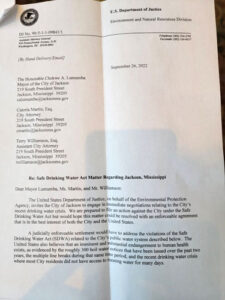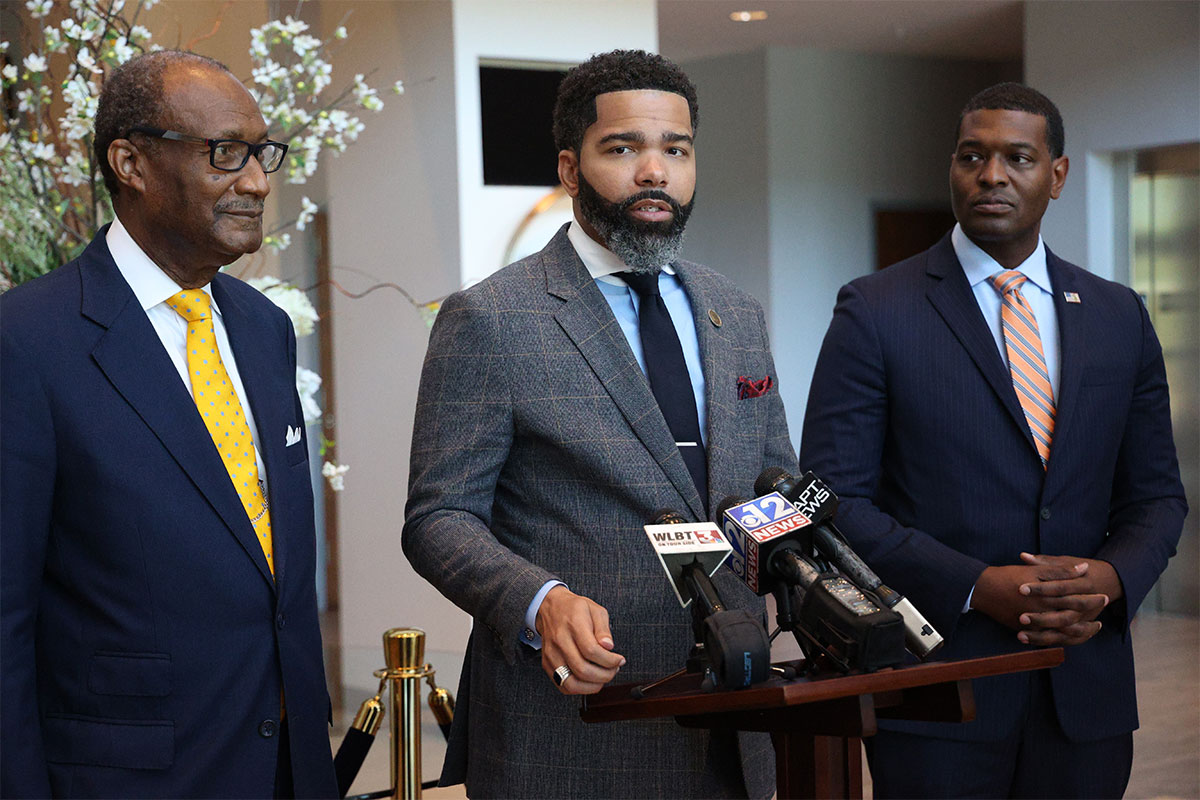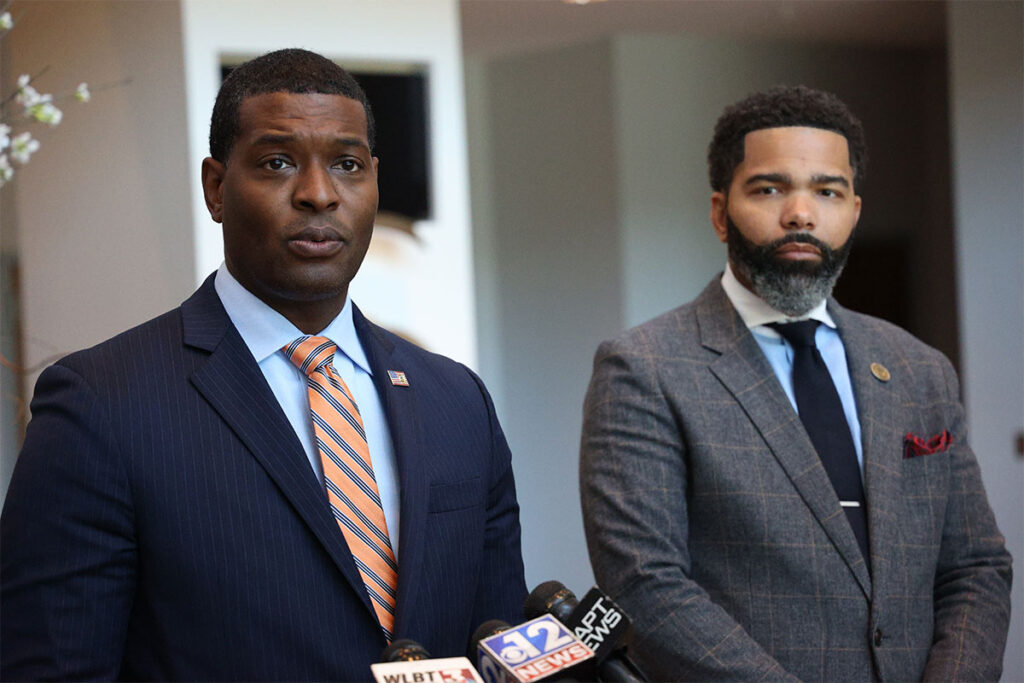JACKSON, Miss.—The U.S. Department of Justice is seeking an enforceable agreement with the City of Jackson to address multiple violations of the Safe Drinking Water Act, many resulting from long-standing deficiencies at O.B. Curtis, Jackson’s primary water treatment plant.
“The United States also believes that an imminent and substantial endangerment to human health exists, as evidenced by the roughly 300 boil water notices that have been issued over the past two years, the multiple line breaks during that same time period, and the recent drinking water crisis where most City residents did not have access to running water for many days,” Assistant Attorney General Todd Kim, of the DOJ’s Environment and Natural Resources Division, wrote in a Sep. 26 letter.
Without a mutual agreement between the regulator and the capital city, the federal agency may pursue legal action against the city to bring its water system in compliance with health and safety standards.

EPA Administrator Michael Regan was on the ground in Mississippi again yesterday, speaking with Jackson Mayor Chokwe A. Lumumba and faith leaders at New Hope Baptist Church in Jackson. In contrast to the serious tone of the Department of Justice’s letter to Jackson, Regan and Lumumba expressed an interest in collaboration to address the water crisis in brief statements prior to the closed door meeting with clergy.
“After years of neglect, Jackson’s water system finally reached a breaking point … leaving tens of thousands of people without running water. These conditions, I believe we all can agree, are unacceptable in these United States of America,” Regan said.
Lumumba praised the EPA for its collaboration with the capital city. “I trust administrator Regan,” he said. “I thank him for bringing forward a vision for the EPA that isn’t merely about its regulatory function, which is valued and necessary, but also an understanding of what communities are really facing and what we need.”
Regan expressed hopes for a “transparent process.”
“We all know that there are compliance challenges with the City of Jackson,” Regan said in a press gaggle shortly thereafter. “But that’s not the end of the story. We also know that we need to chart a path forward (to) a trusted infrastructure that will pursue the right financial choices and the right expertise … a system that the people of Jackson can trust.”
‘An Imminent and Substantial Endangerment’
Many of DOJ’s complaints are familiar ground for the ailing Jackson water system. But the letter reiterates that serious problems remain in the operation of the O.B. Curtis plant and the distribution system as a whole, holding both State of Mississippi and local officials accountable for failure to maintain the facilities.
“The Justice Department believes that contaminants are in or likely to enter the City’s public water system that may present an imminent and substantial endangerment to public health. The Justice Department further believes that State and local authorities have not acted to protect public health, pursuant to Section 1421 of the SDWA,” the letter states.
Jackson’s Safe Drinking Water Act violations include a failure to adequately staff water treatment plants with Class A operators; a failure to implement an alternative water-supply plan, failure to comply with the timeline for general filter rehabilitation; failure to install corrosion control to prevent lead and copper contamination; exceedance of HAA5 (disinfection byproducts) maximum contaminant level, and exceedance of both single and monthly turbidity limits.
Several of the violations constitute a continual inability for Jackson’s water system to meet the Administrative Order of Consent established in 2021, following earlier warnings to the City and State that the water system had serious ongoing issues, including 2020’s emergency order.

But the City has been in the process of addressing some of the key complaints. On Aug. 30, Lumumba explained to the Mississippi Free Press that Jackson had approved an agreement with the Coca-Cola Company to provide water supplies for the city in the event of a crisis, the last step to implementing the EPA-mandated alternative water supply plan.
O.B. Curtis is currently installing upgraded soda-ash treatment facilities that will address the need for proper corrosion control, and the federal assistance that arrived in the capital city following the emergency declaration may help complete that process ahead of schedule.
It is unclear if the letter addresses any new violations of the Safe Drinking Water Act, but the language does not preclude further action against the City. “There may be other violations, claims, or matters not listed above that might be addressed in comprehensive negotiations, or that the United States might pursue in litigation absent a negotiated settlement,” the letter explains.
The document mentions the potential for outside management of Jackson’s water system. “Negotiations would include discussion of accountability mechanisms such as temporary third-party management of the system,” it reads.
Regan acknowledged the possibility of outside management at the press event. “We’re in discussion (about) the best possible path forward to rebuild the infrastructure but also to rebuild the trust of the people. I don’t think that there are any options off the table, but we do believe that a third party that could potentially help us navigate these choppy waters could be beneficial,” he said.
But the administrator said his agency ultimately wanted Jackson to retain ownership of its own water infrastructure. “At the end of the day, we would like for the City of Jackson to maintain control over their water system. We would like for this water system to remain public,” he explained.
Lumumba, for his part, acknowledged that a third party “may be beneficial in augmenting our staffing (needs),” but reiterated his interest in keeping the system under City of Jackson ownership. “Our belief that the City of Jackson should still have ownership of the system has been well communicated,” he said.










